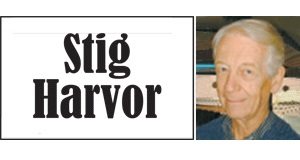 Stig Harvor –
Stig Harvor –
After four tumultuous years of Rob Ford’s mismanagement as mayor and failings as a person, what happened in our Oct. 27 civic election? One third (33.7%) of voters backed a continuation of Ford policies. Why?
Ford voters are spread throughout our city. Most live in suburban areas of Etobicoke and Scarborough who feel “Downtown elites” have ignored them. Some are less educated with low incomes, under- or unemployed. A number are recent immigrants and visible minorities. They are the very people most hurt by Ford policies of inadequate services and cutbacks. Why then do they cling to Ford?
The reasons are many and complex. A basic reason seems to be that many Ford supporters vote purely on feelings, not facts. Given their often trying circumstances, many of them have not the time, information and knowledge to grasp the effect of politics or policies. Simple-minded slogans suffice.
On their own, both old and new residents can understandably have difficulty dealing with our formal, multi-headed, megacity bureaucracy. They feel left out. In comes a politician: folksy, a bit like themselves. He personally answers their phone calls and visits them. He creates the impression he is their man to solve what to them are immediate problems.
Eureka! They have found their saviour. He connects with them on a very personal, gut level. Never mind the saviour is an immature, flawed person. They can sympathize with his weaknesses, particularly when he apologizes, even too profusely, and then enters rehab. When at the last moment he is diagnosed with cancer and enters strenuous treatment, he evokes natural pity.
There are larger and wider forces at work. Canada’s secular society can be a challenge. It has undergone remarkable changes in the many years since the Second World War. Feminism and the sexual revolution have challenged many traditional concepts of the supremacy of males and the sanctity of the traditional family.
The religions of marginalized persons can set them apart from the mainstream. Varied and more fundamentalist houses of worship fulfill their need for social contact but do not help them adjusting to new circumstances.
Ford Nation becomes an easy prey for manipulation by the powers-that-be. These powers own and control the media in all its forms: print, TV, radio. They basically promote the status quo that benefits their own narrow interests of private gain.
Public issues today are often technical and complicated even for people who pay attention to them. The media information that reaches Ford supporters often concentrates on simple, small issues that regular people can identify with in their personal lives. Highlighted are pennies in city counsellors’ office expenses. The allocation of the huge $9.6 billion city budget is totally beyond comprehension.
The Fords connected with Ford Nation. Our new mayor, John Tory, is the antithesis of the Fords. He is rightly incapable of imitating the folksy Ford image. How then can he connect?
A significant way would be to forcefully tackle the basic problem of poverty, particularly afflicting the core of Ford Nation. Our city is the wealthiest in our country. We have nearly as many millionaires, 118,000, as we have 145,000 poverty-stricken children (see www.socialplanningtoronto.org).
Many issues involving taxes, jobs and wages are under outdated rules controlled by provincial and federal governments. Even so, cities are capable of contributing some limited solutions. A living rather than an inadequate minimum wage for city workers is one example. This can only be maintained by avoiding privatizing public services.
Another example is how our city council has created over 700 jobs for local residents in the rebuilding of Regent Park. This was accomplished by actively encouraging private contractors and commercial tenants to hire locally. Similar techniques are being implemented by publicly controlled Waterfront Toronto in the redevelopment of the West Don Lands (search: Waterfront Toronto Employment Initiative).
 Another way to connect is to effectively improve public transit in Ford Nation territory. Unfortunately, Tory’s overly hyped centrepiece, SmartTrack, does not improve mobility in the Ford areas. More buses and light rail transit (LRT) are required as advocated by others, like Olivia Chow.
Another way to connect is to effectively improve public transit in Ford Nation territory. Unfortunately, Tory’s overly hyped centrepiece, SmartTrack, does not improve mobility in the Ford areas. More buses and light rail transit (LRT) are required as advocated by others, like Olivia Chow.
Yet another way to connect is pushing for and providing more affordable housing. More community facilities are also badly needed.
All attempts to connect with an alienated Ford Nation require public money. Tory is a confirmed right-winger. Like the Fords, he believes in keeping taxes low for everybody, poor or filthy rich. This is the Achilles’ heel of his stature. It can prevent him from lifting Toronto into a truly better city in which all of us feel a part.
 TheBulletin.ca Journal of Downtown Toronto
TheBulletin.ca Journal of Downtown Toronto

